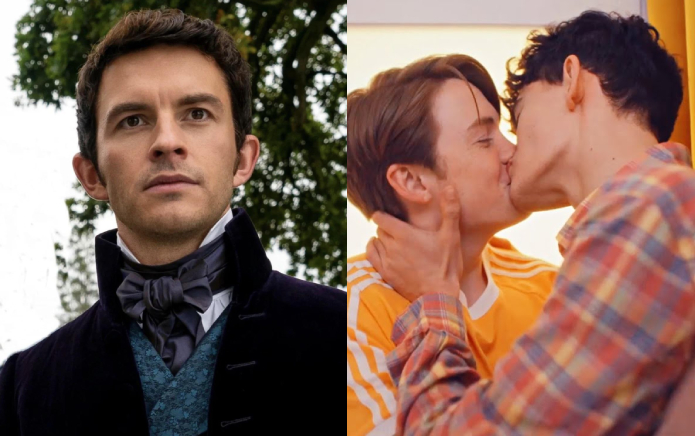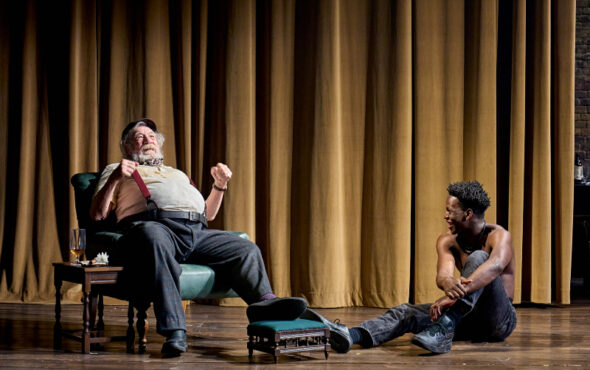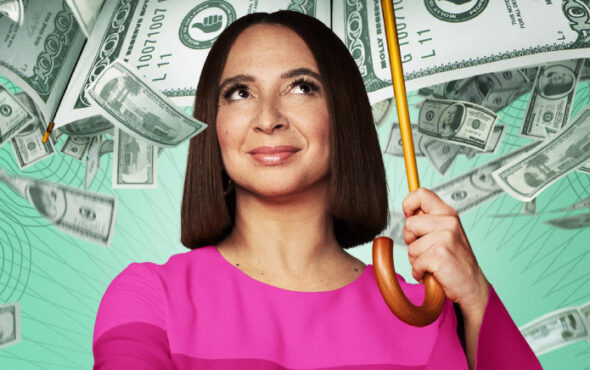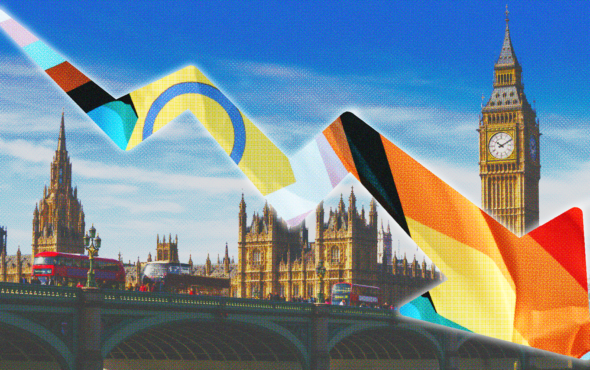
Remember on-screen representation before Heartstopper? Bleak! As! Hell! With a vast majority of productions still insisting on depicting queer-related trauma such as bullying, homophobia and – we love this one! – death slash murder, the first season of the beloved Netflix series won the hearts of millions around the world for being, well, lovely, basically. Admittedly, season two is slightly heavier than its predecessor. However, its exploration of sensitive topics, from self-harm to coming out, still feels quintessentially Heartstopper (optimism, charm and animated squigglies) and, as a result, the series continues to break new ground for LGBTQ+ visibility on the small screen. Read ahead for the most groundbreaking storylines from the second season of Heartstopper below and, it goes without saying: SPOILERS INCOMING. TURN BACK NOW. YOU HAVE BEEN WARNED.
Nick isn’t forced to come out

One of the central storylines in season two is Nick’s (Kit Connor) desire to come out as bisexual and disclose his relationship with Charlie (Joe Locke) to his friends and classmates. But, as queers know – coming out is easier said than done and, of course, it differs based on a person’s race, sexuality, gender identity, upbringing and so forth. What’s wildly refreshing about Heartstopper’s approach to one of the most seminal moments in a queer person’s life is that Nick isn’t forced to come out. He’s continuously told by his mum (the Olivia Colman) and Charlie that he should do so on his own terms; as the latter says, “Nick it’s fine, there’s no deadline.” When Nick inevitably reveals his sexuality to the class, it’s clear that he did so because he’s finally at peace with who he is, and that might not have been the case if he was outed or pressed to come out before he was ready.
Coach Singh’s support

Episode three sees Coach Singh (Chetna Pandya) walk in on Nick and Charlie in the supply closet, mid-smooch. (You’ll discover across the season that secrecy is not their… forté.) What follows is a warm-hearted conversation between Nick and Singh, where she throws her unequivocal support behind the duo and tells him that, if “any of the lads” on the rugby team “say anything out of line”, to let her know – so she can presumably hand out a bollocking for their ignorance. (The teacher all queers need and deserve!) She subsequently reveals to Nick that “things were pretty bad” for LGBTQ+ acceptance when she played women’s rugby at university, which is where she met her wife. (A lightbulb moment for Nick.) And, in similar vein to his mum and Charlie, Singh reiterates to Nick that he doesn’t necessarily need to come out just yet, saying his rugby teammates aren’t ‘owed that information’. As an older LGBTQ+ person who’s experienced discrimination and homophobia, it’s clear that Singh’s guidance means a lot to Nick.
“I know I don’t eat like normal people”
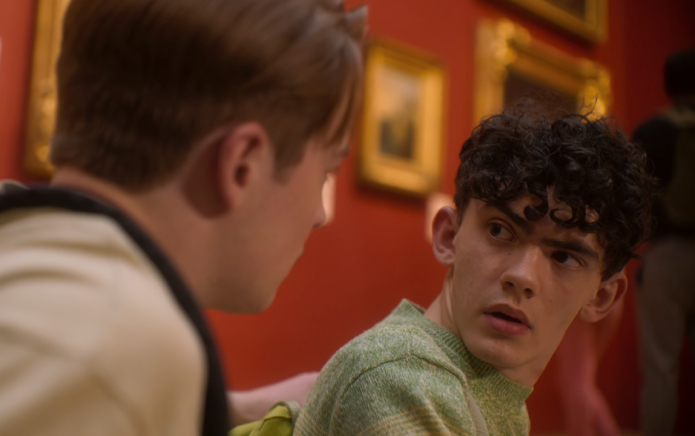
During their school trip to Paris, Charlie unexpectedly faints in the middle of The Louvre. Later, Nick tries to understand why this happened, telling Charlie that he’s noticed his ‘general’ lack of appetite and that he’s ‘eaten less’ than usual. After Charlie apologises, Nick stresses that he has “nothing to be sorry about” and that he simply wishes to understand what he’s going through. “I know I don’t eat like normal people,” confides Charlie. “Some days I’m fine, but other days I feel like I need to… control it.” (Give Locke and Connor another Emmy for this scene, honestly.) According to The Trevor Project, LGBTQ+ young people “experience significantly greater rates of both eating disorders” compared to their cisgender and heterosexual counterparts. As a result, there will undeniably be LGBTQ+ viewers who resonate with Charlie’s journey. For such a sensitive issue to be addressed on a show such as Heartstopper, a show tailored to LGBTQ+ youth, is groundbreaking.
“I don’t want to feel like that anymore”

Following on from the last point, the season two finale sees Charlie open up about anti-LGBTQ+ bullies and how their homophobic and ignorant actions impacted his mental health. “People would just call me disgusting to my face. And It went on for so long that I think I started to believe what they were saying. It made me really hate myself,” he tells Nick, before revealing that it caused him to self-harm: “I don’t want to feel like that anymore.” As is the case with eating disorders, LGBTQ+ people are more disproportionately affected by self-harming and thoughts of suicide when compared to their cis-het counterparts. The Trevor Project’s 2022 National Survey on LGBTQ Youth Mental Health discovered that 45% of LGBTQ+ youth “seriously considered” attempting suicide in the past year. Again, with how much reach Heartstopper has, particularly amongst young people, Charlie’s struggles with self-harm and eating disorders will undoubtedly help thousands of people come to terms with their own struggles. Hopefully, it will also inspire them to reach out for help.
“Elle is the most special girl”
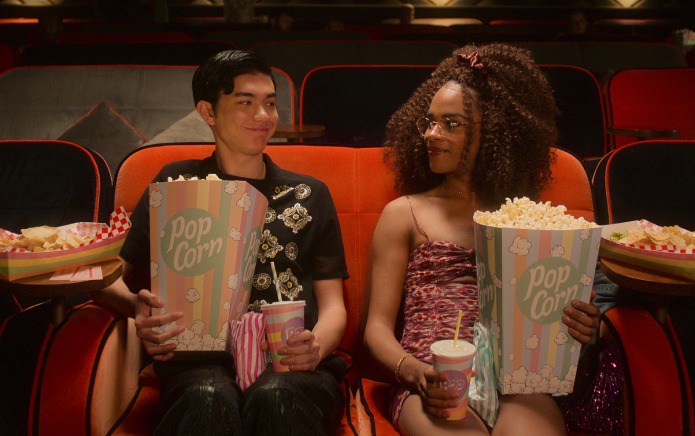
In the opening few minutes of episode seven, Tao’s (William Gao) mother Yan Xu (Momo Yeung) walks in on her son dancing in a state of euphoria. When he reveals that his jubilant mood is a result of him and Elle (Yasmin Finney) becoming official, her reaction is pure joy. “Elle is the most special girl, the perfect girl for my perfect boy,” she says, excitedly stating that she must call all of their relatives. With vile, anti-trans rhetoric continuing to plague the news in the UK (and beyond), seeing a mother celebrate her son’s relationship with a trans person – without tired conversations about what this may mean for Tao’s sexuality – is quite radical.
Isaac’s asexual journey

Heartstopper is already groundbreaking for how many identities it depicts under the LGBTQ+ umbrella: L, with Tara (Corinna Brown) and Darcy (Kizzy Edgell); G, with Charlie (Locke) and Ben (Sebastian Hope); B, with Nick (Connor); and T, with Elle (Finney) and Naomi (Bel Priestly). In season two, one of the most marginalised LGBTQ+ identities is represented with Isaac (Tobie Donovan), who is seemingly coming to terms with his asexual identity. (Just FYI: only two out of 637 LGBTQ+ characters on TV between 2021-2022 were asexual.) “I don’t know how I’m supposed to feel when I have a crush on someone. I read all the books where people fall in love, and I still have absolutely no idea,” he tells his love interest James (Bradley Riches). “I think there might be something wrong with me.” Later, Isaac meets an aromantic and asexual artist, who explains what it’s like to live in a world “where romance and sex and prized above everything else, when you don’t feel those forms of attraction”. It’s clear that Isaac identifies with his comments, and while he doesn’t label himself as asexual in the series, the team behind Heartstopper are breaking new ground by providing the character with the space to explore being aromantic/asexual. Hopefully – fingers and toes crossed etc! – this trailblazing story will continue into season three.
Trans sisterhood

In 2023, it’s still rare for a television show – or any piece of media, for that matter – to boast a main trans character, let alone a main trans character whose narrative doesn’t solely revolve around their transness, which is why Elle (Finney) has been hailed as one of the most groundbreaking LGBTQ+ characters in history. Season two sees Elle cross paths with Naomi, a fellow trans teen who, like herself, is applying for the Lambert School of Art. She immediately bonds with Naomi and her friend Felix (Ash Self), with the former revealing that she ‘hates’ her current school because she’s known as “the trans girl” and wants to be accepted into Lambert so she can be simply known as Naomi. Elle instantly identifies with this, and becomes close with Naomi and Felix across the course of the season. With the mainstream media’s vendetta against the trans community in the UK, it’s monumental to see two trans teenagers thriving and finding solace within each other. More of this trans sisterhood, please!
The second season of Heartstopper is now streaming on Netflix.
If you’ve been affected by any of the topics raised in this article, Switchboard runs a national LGBTQ+ helpline you can reach out to for support at 0800 0119 100. It’s open from 10am-10pm, 365 days a year and is run by a team of volunteers who all identify as LGBTQ+.
